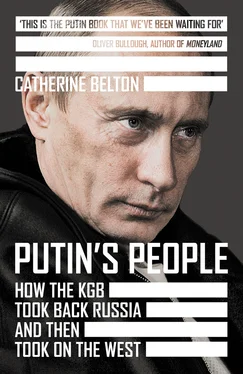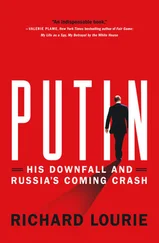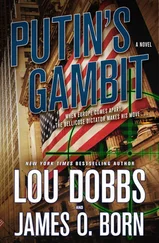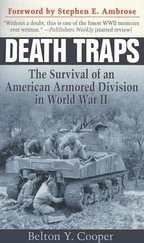Many years later, Klaus Zuchold, one of Putin’s recruits in the Stasi, offered some partial details of Putin’s involvement in other active measures then. Zuchold, who’d defected to the West, told a German publication, Correctiv , that Putin had once sought to obtain a study on deadly poisons that leave few traces, and planned to compromise the author of this study by planting pornographic material on him.[86] It’s not clear whether the operation ever got off the ground. Zuchold also claimed that Putin’s activities included a role as the handler of a notorious neo-Nazi, Rainer Sonntag, who was deported to West Germany in 1987, and who returned to Dresden after the Wall’s fall and stoked the rise of the far right.[87] By the time I sought out Zuchold to ask him about Putin’s alleged work with the Red Army Faction, he had long gone to ground, and didn’t respond to interview requests. According to one person close to Western intelligence, he was under the special protection of the Bundesamt für Verfassungsschutz.
*
While working with the Red Army terrorists may have been Putin’s training ground in active measures against the imperialist West, what happened when the Berlin Wall came down was the experience he would carry with him for decades to come. Though it had become ever clearer that the eastern bloc might not hold, that social unrest could tear it apart and that the reverberations could reach into the Soviet Union itself, still Putin and the other KGB officers in Dresden scrambled to salvage networks amid the sudden speed of the collapse.
In a moment, it was over. There was suddenly no one in command. The decades of struggle and covert spy games seemed done. The border was gone, overwhelmed by the outpouring of protest built up over so many years. Though it took another month for the protests to reach Dresden, when they came, Putin and his colleagues were only partially prepared. While the crowds massed in the bitter cold for two days outside the Stasi headquarters, Putin and the other KGB men barricaded themselves inside the villa. ‘We burned papers night and day,’ Putin said later. ‘We destroyed everything – all our communications, our lists of contacts and our agents’ networks. I personally burned a huge amount of material. We burned so much stuff that the furnace burst.’[88]
Towards evening, a few dozen protesters broke off and headed towards the KGB villa. Putin and his team found themselves almost abandoned by the nearby Soviet military base. When Putin called for reinforcements to protect the building, the troops took hours to arrive. He telephoned the Soviet military command in Dresden, but the duty officer merely shrugged, ‘We cannot do anything without orders from Moscow. And Moscow is silent.’[89] It seemed to Putin a betrayal of all they had worked for: the phrase ‘Moscow is silent’ rang through his head for a long time. One by one, the outposts of empire were being given up; the geopolitical might of the Soviet Union was collapsing like a house of cards. ‘That business of “Moscow is silent” – I got the feeling then that the country no longer existed. That it had disappeared. It was clear the Union was ailing. And it had a terminal disease without a cure – a paralysis of power,’ Putin said later.[90] ‘The Soviet Union had lost its position in Europe. Although intellectually I understood that a position built on walls cannot last, I wanted something different to rise in its place. But nothing different was proposed. That’s what hurt. They just dropped everything and went away.’[91]
But not all was lost. Though the fierceness of the protests and the timing of the ensuing collapse appeared to have taken the KGB by surprise, parts of it, together with the Stasi, had been preparing for that day. Parts of the KGB had been planning for a more gradual transition in which they would retain an element of influence and control behind the scenes.
Somehow, the KGB officers in Dresden managed to get one of their Stasi counterparts to hand over the vast majority of the Stasi’s files on their work with the Soviets before the protesters burst into the Stasi headquarters. Putin’s colleague from the earlier Dresden days, Vladimir Usoltsev, recounted that a Stasi officer handed over the files in their entirety to Putin. ‘Within a few hours, nothing remained of them apart from ashes,’ he said.[92] Reams of documents were taken to the nearby Soviet army base and thrown into a pit, where it was planned that they would be destroyed with napalm, but they were burned with petrol instead.[93] A further twelve truckloads were spirited away to Moscow. ‘All the most valuable items were hauled away to Moscow,’ Putin later said.
Over the next few months, as they prepared their exit from Dresden, they were provided with special cover from the powerful head of the KGB’s illegals department, Yury Drozdov, the legendary officer in charge of overseeing the KGB’s entire global network of undercover sleeper agents. The Dresden station chief, Vladimir Shirokov, told of how Drozdov made sure he was watched over from six in the morning to midnight. Finally, in the dead of night Shirokov and his family were driven to safety across the border to Poland by Drozdov’s men.[94] Later, one of Putin’s former colleagues told journalist Masha Gessen that Putin met with Drozdov in Berlin before he travelled home.[95]
The Dresden KGB ‘friends’ disappeared into the night, leaving little trace, abandoning their Stasi colleagues to face the people’s wrath. It was a pressure Horst Böhm, the local Stasi chief, seemed unable to bear. In February the following year he apparently took his own life while under house arrest. ‘He didn’t see any other way out,’ said Jehmlich. ‘To protect his house, he removed all the fuses and then he poisoned himself with gas.’[96]
Two other Stasi commanders in neighbouring regions were also reported to have killed themselves. What precisely they feared most, we may never know, as they died before they’d been questioned on their roles. But for the KGB, although they’d been forced to abandon their posts, some of their legacy at least had been left intact. Part of their networks, their illegals, remained hidden far away from scrutiny and sight.[97] Much later, Putin would speak with pride of how his work in Dresden had mostly revolved around handling the illegal ‘sleeper agents’. ‘These are unique people,’ he said. ‘Not everyone is able to give up their life, their loved ones and relatives and leave the country for many, many years to devote themselves to serving the Fatherland. Only an elect can do this.’[98]
After Hans Modrow, backed by the Soviets,[99] took over as East Germany’s interim leader that December, he quietly allowed the Stasi’s foreign-intelligence arm, the HVA, to liquidate itself.[100] Untold assets disappeared in the process, while hundreds of millions of marks were siphoned off through the Liechtenstein and Swiss front companies of Martin Schlaff. Amid the jubilance of reunification, the voices of defectors from the Stasi to the West were rarely heard. But a few of them spoke out. ‘Under certain conditions, parts of the network could be reactivated,’ one such defector said. ‘Nobody in the West has any guarantee as to whether some of these agents will be reactivated by the KGB.’[101]
*
When Putin returned home to Russia from Dresden in February 1990, the impact of the Berlin Wall’s collapse was still reverberating across the Soviet Union. Nationalist movements were on the rise, and threatening to tear the country apart. Mikhail Gorbachev had been thrust onto the back foot, forced to cede ever more ground to emerging democratic leaders. The Soviet Communist Party was gradually starting to lose its monopoly on power, its legitimacy coming ever more under question. In March 1989, almost a year before Putin’s return to Russia, Gorbachev had agreed to hold the first ever competitive elections in Soviet history to choose representatives for a new parliament, the Congress of People’s Deputies. A ragtag group of democrats led by Andrei Sakharov, the nuclear physicist who’d become a dissident voice of moral authority, and Boris Yeltsin, then a rambunctious and rapidly rising political star who’d been thrown out of the Politburo for his relentless criticism of the Communist authorities, won seats and debated against the Communist Party for the first time. The end was rapidly nearing for the seven decades of Communist rule.
Читать дальше












